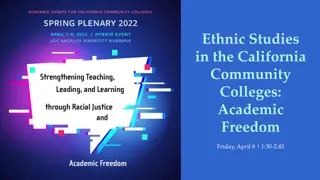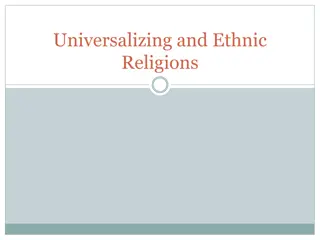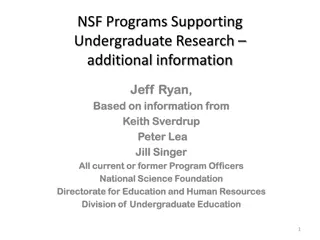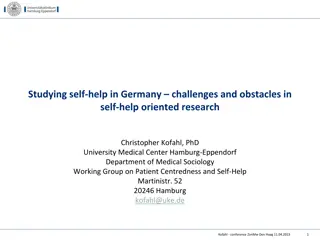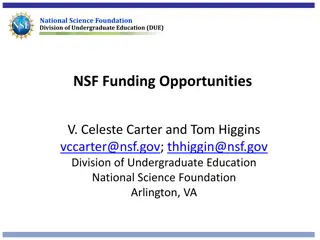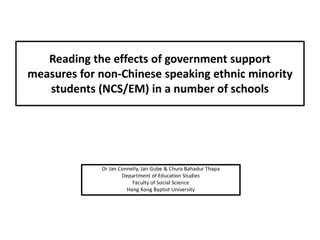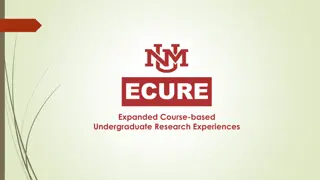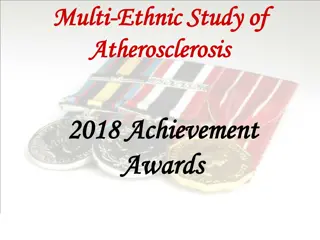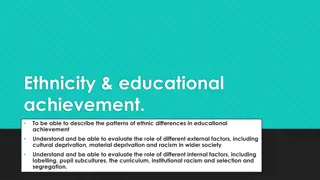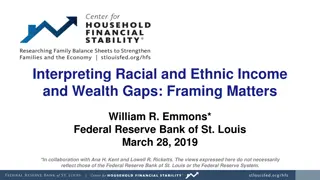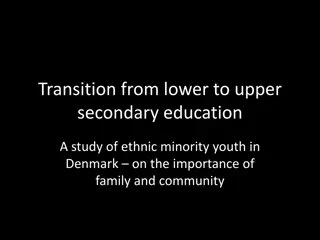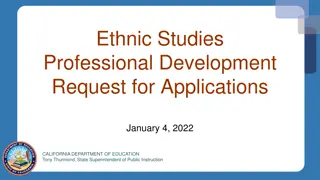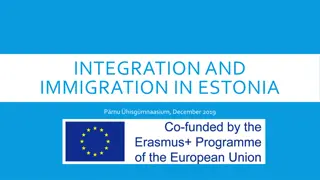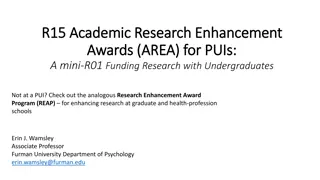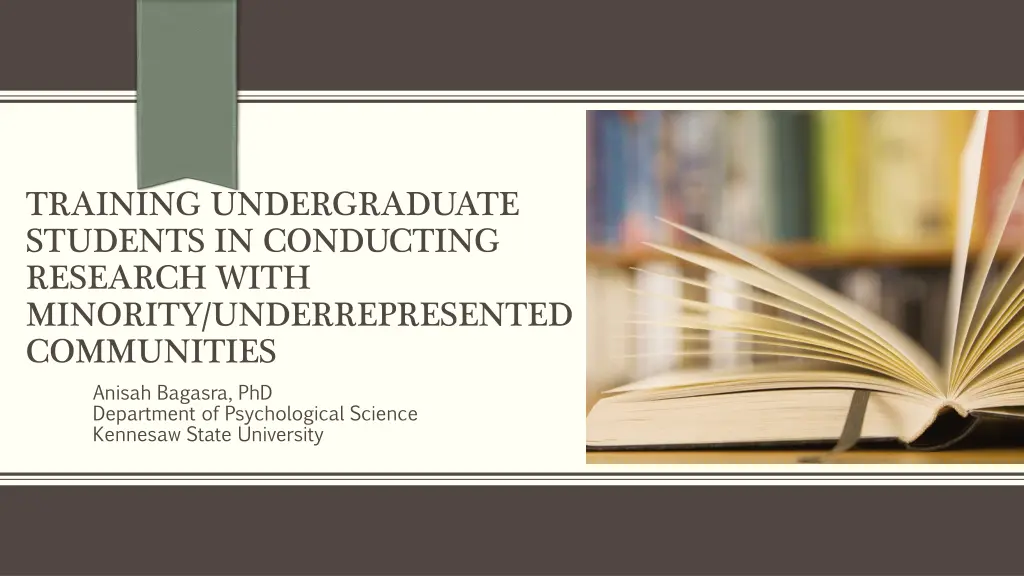
Mentoring Undergraduate Students in Research with Minority Communities
This workshop by Dr. Anisah Bagasra at Kennesaw State University focuses on training undergraduates in conducting research with minority/underrepresented communities. Participants will learn strategies for addressing challenges, forming partnerships, and addressing ethical issues, among other skills essential for successful student-led research projects.
Download Presentation

Please find below an Image/Link to download the presentation.
The content on the website is provided AS IS for your information and personal use only. It may not be sold, licensed, or shared on other websites without obtaining consent from the author. If you encounter any issues during the download, it is possible that the publisher has removed the file from their server.
You are allowed to download the files provided on this website for personal or commercial use, subject to the condition that they are used lawfully. All files are the property of their respective owners.
The content on the website is provided AS IS for your information and personal use only. It may not be sold, licensed, or shared on other websites without obtaining consent from the author.
E N D
Presentation Transcript
TRAINING UNDERGRADUATE STUDENTS IN CONDUCTING RESEARCH WITH MINORITY/UNDERREPRESENTED COMMUNITIES Anisah Bagasra, PhD Department of Psychological Science Kennesaw State University
Workshop Learning Outcomes At the conclusion of this workshop, you will be able to: 1) Identify major challenges you face when embarking on research projects with undergraduate students, and how these challenges may be amplified in ethnic/religious other minority community research. 2) Identify available resources and mentors who can be consulted when designing research aimed at specific ethnic, religious, or other minority groups. 3) Describe effective strategies to forming sustainable community-based research partnerships. 4) Describe effective strategies to addressing ethical issues and distrust of research and researchers that could impact the success of student-led research.
Undergraduates in the Research Training Pipeline: Many Flavors Course-Based Undergraduate Research Experiences (CUREs) Research Internships (Volunteer or for Credit) First Year Research Experiences Grant-based research experiences (REUs, Undergrads incorporated into a funded project) Student Initiated Undergraduate Projects (Honors Thesis, etc).
What is your Role as a Mentor? Provide students with scaffolding to engage in: Research design (Hypothesis-creation, literature search, study design) Research Ethics Data Collection Data Analysis Data Dissemination (Undergraduate Research Conferences, Psi Chi etc) What Skills do you want students to gain as part of this process? Communication Skills Data entry, coding, analysis/interpretation Independence Collaboration as part of a lab group
Mentoring Students Engaging in Research Focusing on Under- represented Populations: Your Responsibilities Assess the mentee(s) for: Maturity level Communication skills Long-terms goals or aspirations Previous experiences with research or under-represented populations Openness to new ideas Develop a Plan Collaboratively Is this project feasible within the agreed upon time period? Is there sufficient access to the study population? Are there any anticipated challenges or barriers? What are your expectations from this project? What are the expectations of the undergraduate student?
Historical Issues in Research w/Ethnic Minority Populations Lack of invitation to participate in research When asked to participate, previous research exploited minorities, or were used to prove inferiority Historical treatment has led to distrust Language and cultural barriers persist Researcher bias persists Failure to see research or representation in research as important.
Research with Ethnic Minority Populations: Things to Consider Before Embarking on a Project What do I know about the Ethnic Minority Population(s) that are part of the research? What does the student(s) know? What particular situational circumstances must we be aware of? What method is proposed for data collection and is this a common or accepted method within this community? Who are the community stakeholders or leaders and what is the research teams relationship with such stakeholders? What is the reputation of your institution within that community? What are my own potential biases or pre-conceived notions about the community/targeted study populations?
Some Community Perceptions of Research It s called Helicopter Research. They flew in, took our personal info, took off. We never got anything back. The academics got a grant for reducing smoking but what we re really concerned with is gun and gang violence. Did they need to do that big long study to prove what we already knew? The professor can t just walk in with the expectation of creating a partnership. It takes time to understand each other and make sure we won t be exploited. I get calls from students every week. They want to interview me, have access to my clients, help them with a class or a paper. I don t have time.
Important Steps Establish relationships with trusted stakeholders or community leaders Engage in pilot testing/consult community stakeholders to avoid the design of an offensive or tone-deaf study. Lead Frequent Check-ins with students. If low response rate, discuss possible steps with stakeholders and study recruitment/distribution strategies. Share findings with community
Dealing with Ethical Issues and Community Mistrust Familiarize yourself with any causes of mistrust of research or researchers within the community. Past histories of unethical research Research that is perceived as targeting or exploiting the community Research that is perceived as painting the community in a bad light What steps can your undergraduate researcher, in consultation with you and community stakeholders take to address such concerns?
Relevant References/Further Reading Amer, M. and Bagasra, A. (2013). Psychological research with Muslim Americans in the age of Islamophobia: Trends, challenges, and recommendations. American Psychologist, 68(3), 134-144. Brew, A., & Mantai, L. (2017). Academics perceptions of the challenges and barriers to implementing research-based experiences for undergraduates. Teaching in Higher Education, 22(5), 551 568. https://doi.org/10.1080/13562517.2016.1273216 Sciame-Giesecke, S., Roden, D., & Parkison, K. (2009). Infusing diversity into the curriculum: What are faculty members actually doing? Journal of Diversity in Higher Education, 2(3), 156-165. Talley, C. H., & Williams, K. P. (2018). Preparing Future Healthcare Professionals for Community Engagement: A Course-Based Research Experience. ABNF Journal, 29(2), 33 41. Wiggins, S., Chiriac, E. H., Abbad, G. L., Pauli, R., & Worrell, M. (2016). Ask not only what can problem-based learning do for psychology? but what can psychology do for problem-based learning? A review of the relevance of problem-based learning for psychology teaching and research. Psychology Learning & Teaching, 15(2), 136 154. Van Vliet, K. J., Klingle, K. E., & Hiseler, L. E. (2013). The mentorship of undergraduate students in counselling psychology research. Counselling Psychology Quarterly, 26(3/4), 406 426. https://doi.org/10.1080/09515070.2013.844095
Contact Information Anisah Bagasra, PhD Assistant Professor of Psychology Department of Psychological Science 440 Bartow Ave Social Sciences 2017, MD 2202 Kennesaw, GA 30144 p: 470-578-5254 e: abagasra@kennesaw.edu w: http://facultyweb.kennesaw.edu/abagasra/index.php

